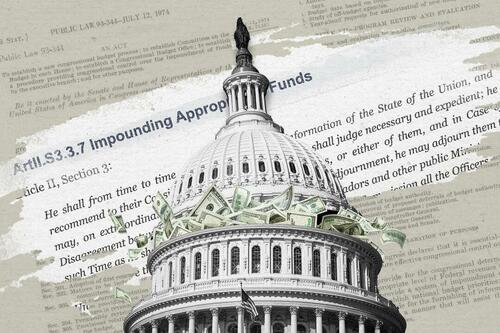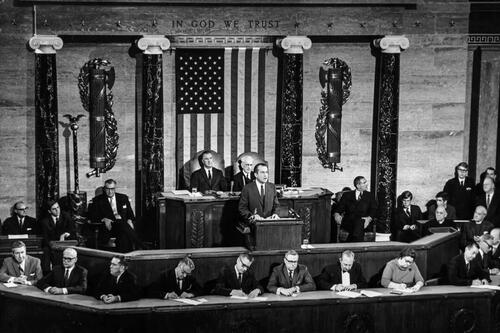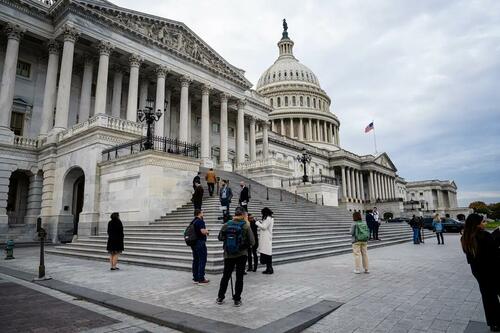Trump Plans To Use Impoundment To Cut Spending - What Is It?
Authored by Lawrence Wilson via The Epoch Times (emphasis ours),
President-elect Donald Trump has said he intends to cut government spending by reasserting the presidential power of impoundment, a move certain to spark a court battle and one that could redefine presidential power for decades to come.

Impoundment occurs when the president chooses not to disburse funds authorized by Congress; instead leaving them unspent in the U.S. Treasury.
This power is not mentioned in the Constitution but has been employed by presidents since Thomas Jefferson. Congress enacted limits on the practice 50 years ago.
Now, Trump intends to challenge the Impoundment Control Act of 1974 (ICA), which he believes is unconstitutional.
“I will use the president’s long-recognized Impoundment Power to squeeze the bloated federal bureaucracy for massive savings,” Trump said when announcing his plan in June 2023.
Others say the ICA was needed to prevent the misuse of impoundment to alter congressional spending priorities, not merely eliminate waste.
Expanded use of impoundment power seems certain to be challenged in court.
Resolution is likely to hinge on two constitutional questions that define the balance of power between the executive and legislative branches of the federal government.
Jefferson appears to have been the first to use impoundment.
In 1803 he delayed purchasing gunboats to patrol the Mississippi River because they were no longer needed after the United States acquired the Louisiana Territory from France.
Since then, most presidents appear to have used the practice from time to time, and usually because the spending was no longer in the public interest.
President Ulysses S. Grant used impoundment to prevent federal funds from being used on river or harbor projects that would benefit private parties rather than the public.
President Franklin Roosevelt used it to limit spending on civilian construction projects to concentrate on wartime spending.
President Lyndon Johnson impounded some money to reduce inflation.
President Richard Nixon used the practice more frequently than previous executives, and his use of impoundment represented “a difference in kind, not simply in degree” from his predecessors, according to Joshua Chafetz a professor of law and politics at Georgetown University.
Nixon’s opponents argued that he was assuming the power to do away with certain government programs by simply starving them of funds, which violated the will of Congress.

His team argued that presidents have a duty to consider other factors, including inflation, when deciding if or when to release government funds.
Congress then passed the ICA, which, in addition to reforming the congressional budgeting process, strictly limited the executive’s ability to cut or delay spending the money appropriated by Congress.
Nixon signed the bill into law.
The ICA stipulates that presidents must ask congressional permission to impound funds. The president can ask Congress to permit either a recision or a deferral of spending.
A recision is a spending cut.
When the president asks Congress to cut certain spending, he may defer that spending for up to 45 days while Congress considers the matter.
If Congress does not grant the request, the president must release the funds.
A deferral is a delay in spending certain funds to a later point within the current fiscal year.
If Congress doesn’t respond to the deferral request, the president may defer the spending.
Robert Kravchuk, professor emeritus of public policy at Indiana University told The Epoch Times: “In one case, he'd have to hear positively from Congress not to spend money, and that’s the recision.
“In the second case, he hears nothing, then he could go through with his deferral, but he can’t defer it to the next year or the year after that.”

Trump’s Challenge
Article II of the U.S. Constitution states that the president must “take Care that the Laws be faithfully executed.”
Trump has said the ICA violates that clause because it strips the president of discretion in how best to achieve the government’s purposes.
“The [ICA] dramatically limited impoundment, the power of the president to choose not to unnecessarily spend taxpayer dollars, forcing the executive branch to spend every penny of congressionally appropriated funds,” Trump wrote in his statement.
A second argument in favor of impoundment is that congressional appropriations specify a maximum amount that may be spent, not a minimum.
“Congress has the ‘power of the purse,’ so its appropriations necessarily set a ceiling on federal spending for a particular purpose, but it should not set the floor,” Trump said.
That argument was made as early as 1876 when Secretary of War James Cameron wrote that “spending the full amount” of an appropriation “was in no way mandatory.”
Read the rest here...
https://ift.tt/wpCqaSP
from ZeroHedge News https://ift.tt/wpCqaSP
via IFTTT

0 comments
Post a Comment